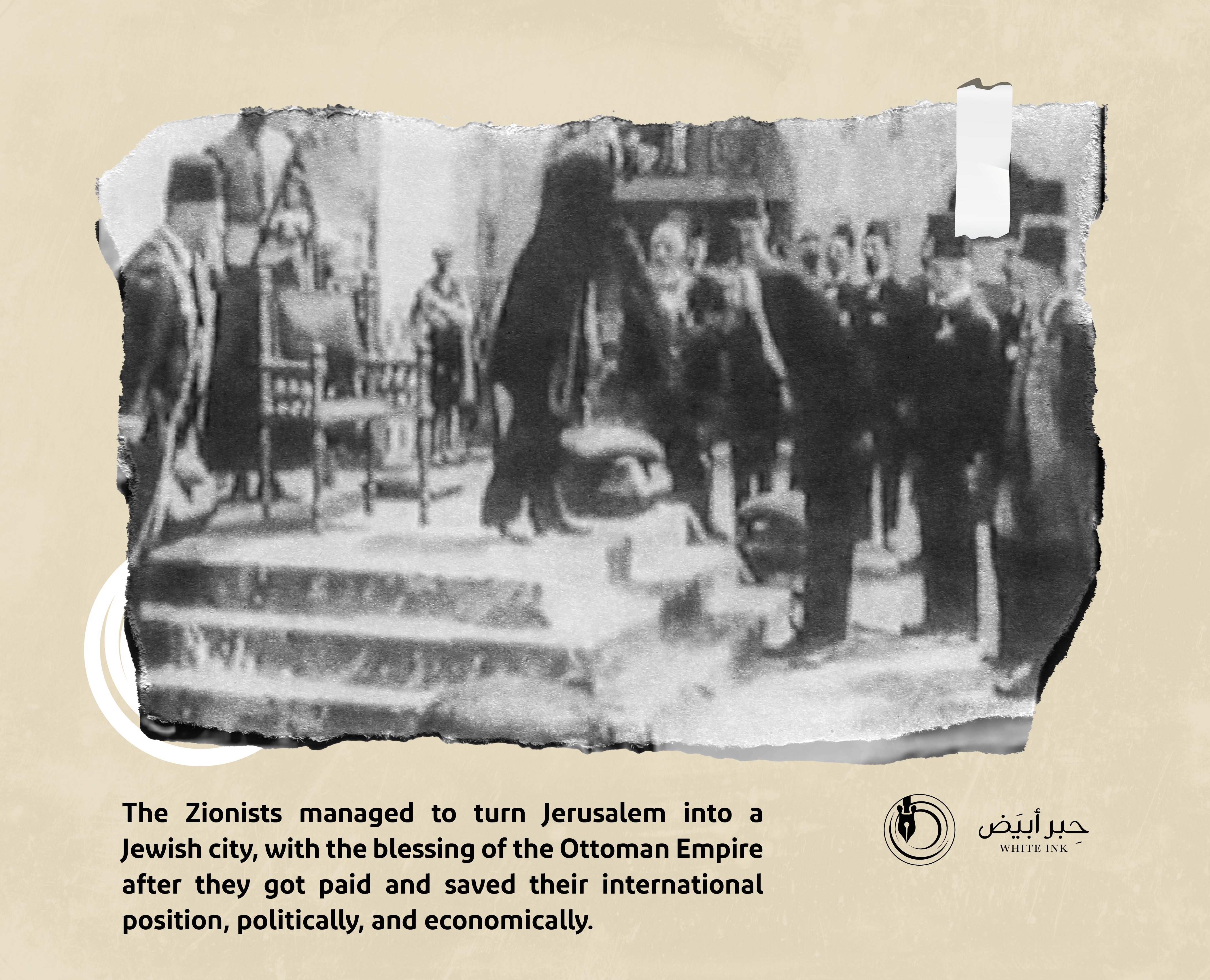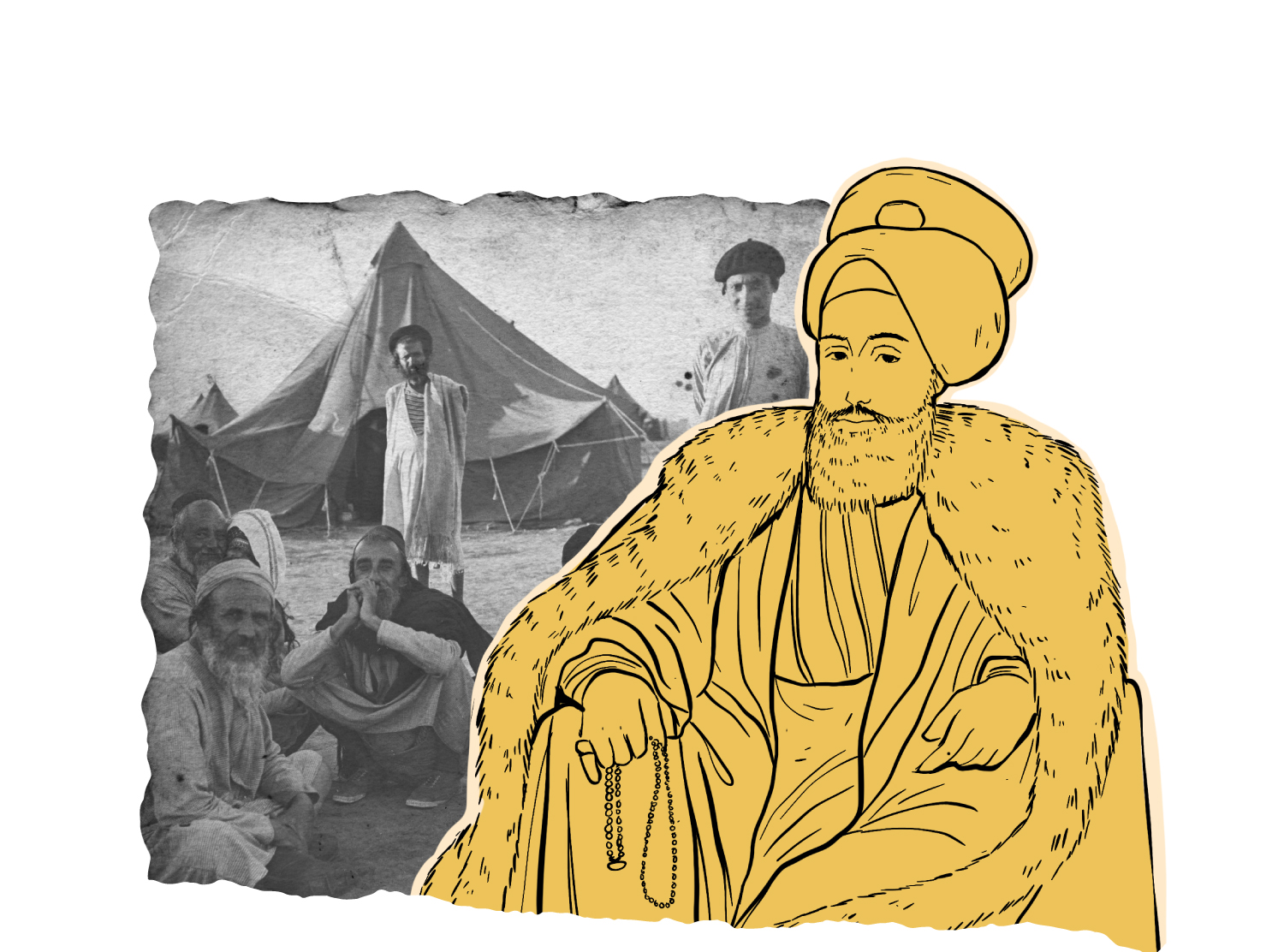
It gathered them after having been lost and helped them to settle in the Arab world
Ottoman Empire.. Sanctuary of Jewish Zionism Diaspora
Throughout their history, Jews have been a unique human gathering through which Zionists were able to exploit religion in order to build an ethnic identity that would surpass the rest of races and refuse to integrate with the rest of societies. On one hand, this constituted an element of unity and strength that made them achieve positive results later to control the most important parts of international decision- making. On the other hand, the isolation of Jews prompted many regimes to suppress them, and try to disintegrate and annihilate them. The religious dimension played an important role rejecting the Christian community, especially the coexistence with the strict Zionist- Jewish component.
In this context, the isolationist attitude of Zionist Jews and their empowering ambitions contributed to their catastrophe and ill fate. Perhaps the first cause lies within the fact that Jews all over the world did not mingle with the original societies. Throughout the long human history, they rather tried to conglomerate together. Such conglomeration led them to be confined within certain areas of the world. Moreover, another element added to that fact is the skill of Jews in the fields of science and philosophy. This was deemed by Christian rulers as a serious threat to belief and a credible attempt to explode it from within.
Perhaps the policy of Christian element implied religious and historical depositions taking into consideration that Christians held the Jews the responsibility of their belief that Jews killed Prophet Jesus, peace be upon him, and his crucifixion after the “Last Supper”; as well as the responsibility of deviating from the Jewish belief. These are myths known as indictments of “Religious Ritual Crimes”.
Otherwise, it is wrong to believe that the first immigration and gathering of Jews was in the land of Palestine. Rather, it is established through facts and testimonies that the most important immigration of Jews was towards Ottoman lands, in conjunction with the immigrations towards the new world (America). We are almost certain that the immigrations towards Anatolia were the beginnings of forming the first world Zionist features that crystallized at the end of the 19th century and the beginning of the 20th century.
As for the first impacts of immigration of Jews towards Ottoman Empire, they were during the reign of Orhan, son of the founder Othman Bin Artgrel, who showed great interest in Jews who demonstrated their success and superiority in the fields of trade, industry, finance. Here the idea of immigrations was evolved in stages. Anatolian Peninsula was considered the destination of Jewish Zionism, especially after they found in Al Othman the protection they lacked in the other European countries.
Immigration of Jews to Anatolia was the start of forming the World Zionism at the end of the nineteenth century.

However, the most important mass immigrations were during the reign of Bayezid II who, in spite of his failure to save Muslims of Al- Andalus, succeeded in saving the Jews of Iberian Peninsula. On this point, the American historian Stanford J. Shaw said, “No fair scholar can deny the role of Sultan Bayezid II with regard to saving the Jews of Iberian Peninsula from being completely annihilated in the furnaces of inquisitions”.
By carefully examining the historical information, it is clarified that Bayezid II did not save Jews as apparently indicated by words; he rather welcomed them after they had been departed by King of Spain, Ferdinand, who expelled more than three hundred thousand Jews from Spain in (1492). Then, he expelled them from Portugal.
Perhaps Bayezid II is dear to the heart of Jews as he was enthusiastic to receive Jews in his country considering their prowess in the field of finance and business. Such behavioral features drove the Ottoman Sultan to issue a firman requiring that official Ottoman employees shall exert all their efforts to facilitate the entry of Jews to Ottoman borders. In addition, severe punishments shall be applied on whoever causes any harm of any kind or mistreats immigrants.
If the era of Bayezid II was the era of saving and receiving Jews, the reign of Suleiman the Magnificent was considered the golden era of Jewish Zionism. The policy of Suleiman was a continuation of Bayezid II policy with regard to receiving Jews who drove Ottomans to areas that were not subject to Turks. This was reflected when a delegation of Jews headed by someone called Joseph Ben Salomon Eskenazi went out of the city of Buda in Hungary to receive Suleiman the Magnificent outside the city. They unconditionally delivered him its keys so that the Ottoman Sultan issued a firman exempting Salomon and his descents from paying all kinds of taxes.
The support of Suleiman the Magnificent for Jews did not stop at this point, it rather extended beyond that point by helping them to establish their first Jewish entity in the city of Tiberias. Moreover, Jewish resources tackled such support in details, whereas Ottoman resources tried hard to deny this support and absolve Suleiman the Magnificent from such treason. This leads to more research and exploration among resources in order to highlight this serious point that had significant projections regarding the historical accumulations that led to the preparation of Jews immigration towards Palestine.


- Stanford J. Shaw, The Jews of the Ottoman Empire and the Turkish Republic (Cairo: Dar Al- Bashir, 2015).
- Jaafar Hasan, Donmeh Sect between Judaism and Islam, ed. 3 (Beirut: Al- Fajr foundation, 1988).
- Ahmed Al- Nuaimi, Jewish Minority and the Ottoman Empire (Baghdad: The General House of Cultural Affairs, 1990).
- Ibrahim Al- Allaf, “The Role of Freemasonry in Contemporary Turkish Social and Political Life” (Dor Al- Masoniya Fi Al- Hayat Al- Egtmaia Wa Al- Syasiya Al- Turkiya Al- Mo’asira), Journal of Social Studies, Bayt Al- Hekma, Baghdad, Nos. (3, 4), (1999- 2000).
- Ahmed Aq Kunduz and Said Oztok, Uknown Ottoman Empire (Istanbul: Ottoman Researches Foundation, 2008).
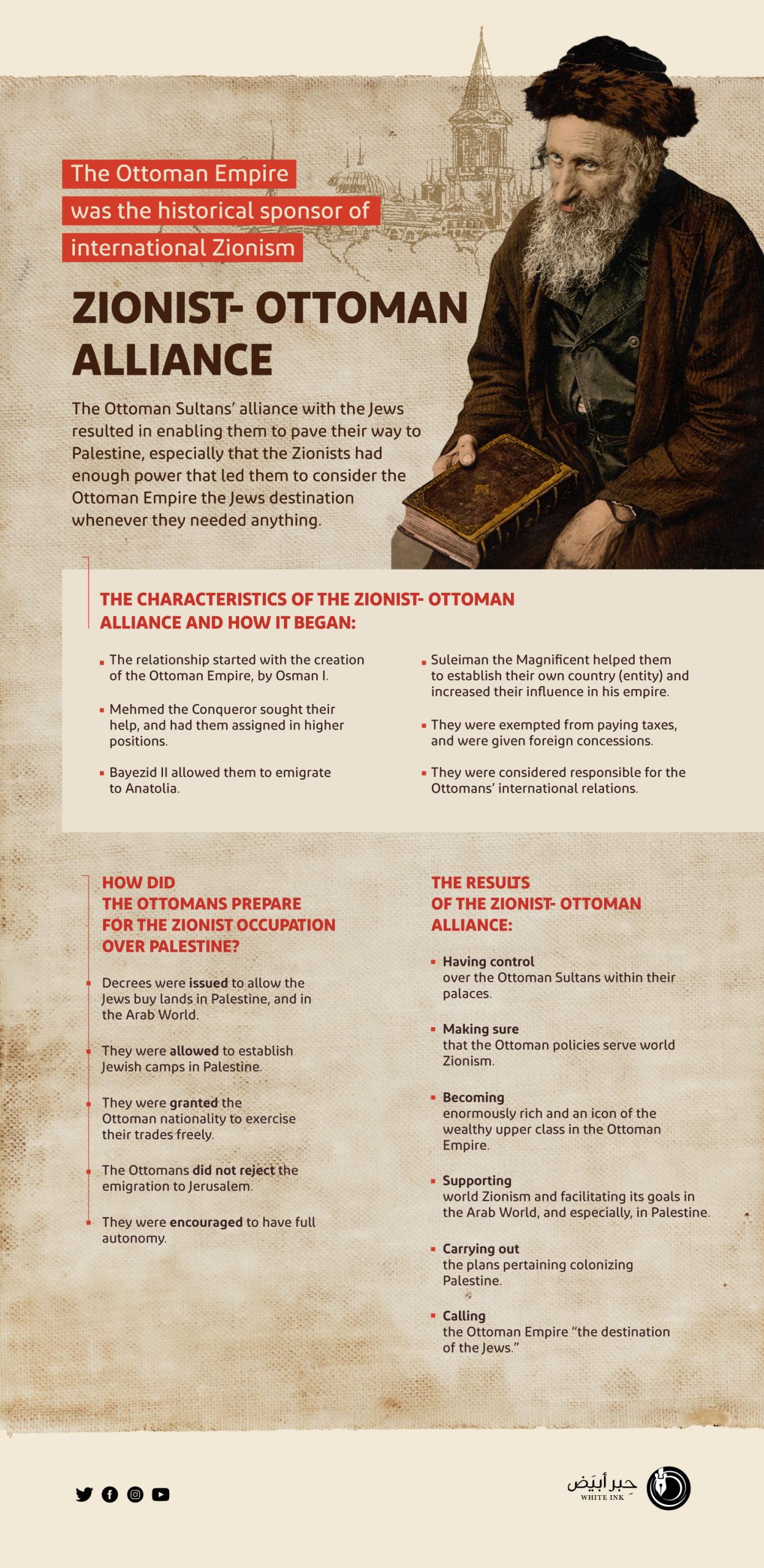
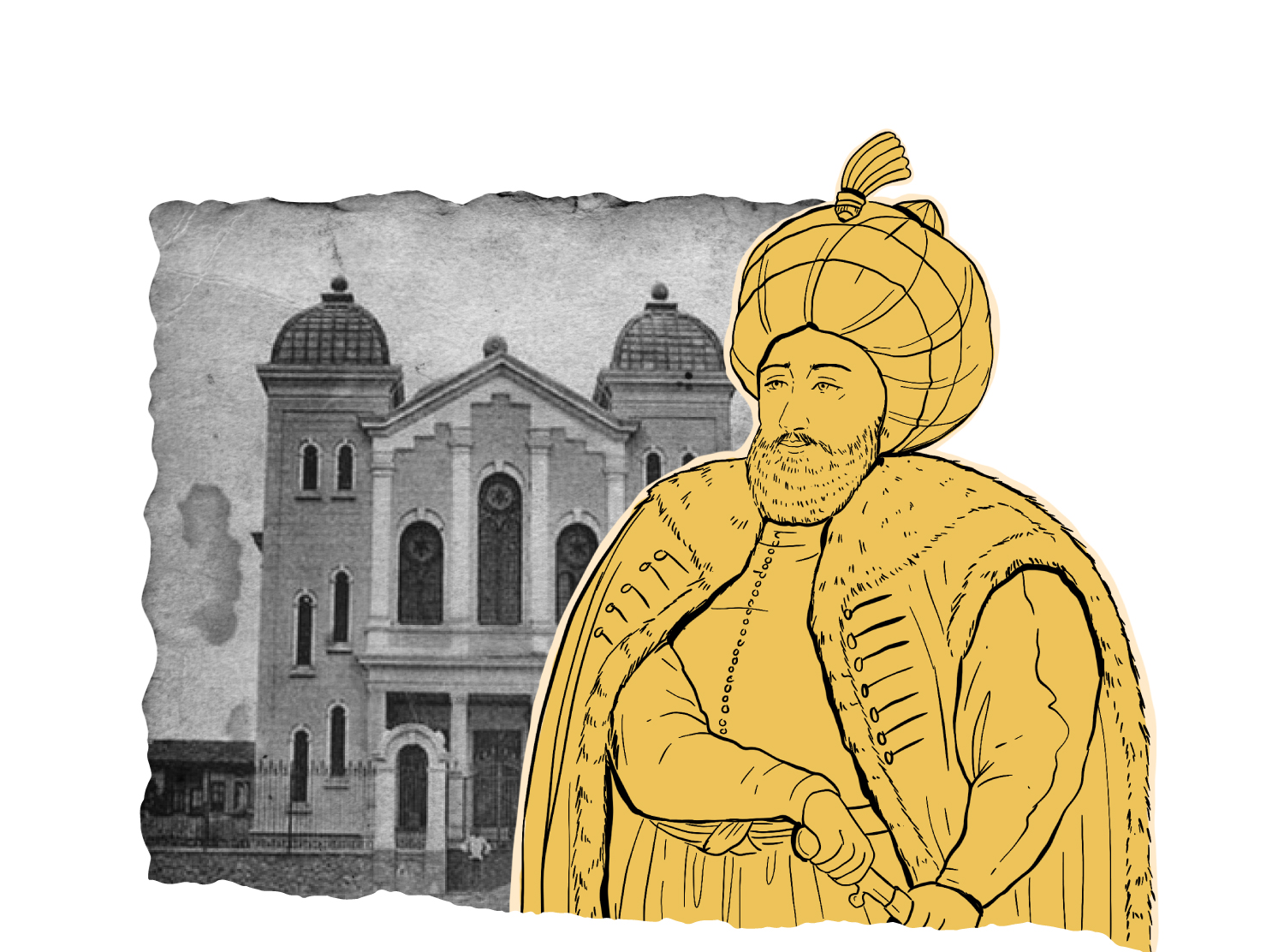
They controlled the global economy
Ottomans Crowned Zionists as Kings of Money and Outrageous Wealth
Some countries know well the difference between tolerance and surrender, as well as giving freedom or being controlled by others. However, Turkish Sultans deliberately ignored this. When they opened the gates for Zionist Jews who fled from massacres, they thought that was tolerance. Nevertheless, firmans of Al Othman clarified that what was happening was nothing but empowerment that drove Zionism to be the foremost of the scene. While later, they became partners of money and influence.
Once the Ottoman Empire was established, Jews lived in Turkish Anatolia as an important population element for Sultans. They became Ottoman citizens who drew consideration, interest, and had deep relationship since the very beginning of the Sultanate up to establishing Turkish Republic and to this day. The relationship between Jews and Ottoman court developed regarding several aspects. However, the commercial aspect remained the most important one of them all as it was a utilitarian relationship between the parties. Jewish Zionism achieved unprecedented gains as they benefited from the period of growth and prosperity, especially during the 15th and 16th centuries.
Zionist Jews became, later, the economic engine inside the Sultanate. They even started lending money to Turkish Sultans which indicates the amount of money that Zionism was able to gain. Perhaps bringing the first printing machine to Ottoman lands is another evidence of their unique position during a time when Muslims were forbidden from doing so. In addition, they infiltrated into the state bodies and occupied prestigious jobs.
Such influence did not suddenly arise as early relationships between the two parties indicate that Zionist Jews cautiously encountered Ottoman Empire when it was established by Othman Bin Artgrel. Notwithstanding, they opened up after they had been welcomed by Turkish Sultans. The establishment of a special neighborhood for Jews to live in and practice their religious customs was a clear indication of the welfare that awaited for them. Later, this helped to buy lands in the occupied Palestine.
Zionists lent money to Ottoman Sultans, while Turks could not prevent their ambitions of occupying prestigious jobs

Welfare did not stop at that point, Turkish Sultans started exempting many Zionist Jews from taxes and allowed them to establish synagogues and schools to teach Jewish religion like the school established in the city of Edirne that became, later on, a cultural and educational center for Jew students throughout the Sultanate.
Meanwhile, Jewish immigrations arranged by Zionism towards Ottoman Empire did not stop, starting from (1376) when they came from Hungary, then (1394) from France, up to (1420) the immigration from Venice.
As for the great immigration towards Ottoman Empire, it was during the reign of Sultan Mohammed Al- Fatih, in addition to Bayezid II. It occurred after Jews had been expelled from Spain, the Kingdom of Portugal, the Kingdom of Naples, and the Kingdom of Sicily. However, that immigration was not by force as Mohammed Al- Fatih sent them an official invitation. Immigrants started to arrive successively in the Empire in huge numbers. In (1492) more than 40 thousand Spanish Jews immigrated fleeing from inquisitions so that Sephardi Jews settled in Constantinople and Thessaloniki.
Within the book titled “Jews in the Ottoman Empire.. Pages of History” (El- Yahoud fil- Imbratoriya El- Othmaniya – Safahat min El- Tarikh), Russian writer, Irma Lvovna, mentioned the legal status of sects. She concluded that the high status of Jews prompted the two parties to adhere to each other in order to achieve common interests.
While the book of “Jews of the Court” (Yahoud Al- Balat) sheds light on the Jews inside the ruling palaces as they became agents and advisors of Turkish Sultans. Due to the immigration of Zionist Jews from Europe, they had administrative and commercial expertise that led them to be the foremost of the scene and to approach the positions of making and affecting decisions. As a result, Sephardi Jews were allowed to settle in the Arabic regions like “Jerusalem, Damascus, and Egypt”.
In the sixteenth century, Jew were crowned as Kings of Money and Outrageous Wealth; as well as vast international trade between the Sultanate and Europe. Their knowledge of European languages, and their relationships with Jewish communities there had a clear impact on developing their works.
American writer, Stanford J. Shaw, described Jews in his book “The Jews of the Ottoman Empire and the Turkish Republic” to be very skilful in writing letters, as well as commercial and banking contracts. They also had extensive relationships with their fellow Jews in other countries. They actually turned into trade monopolists what benefited all of Jews, Sultanate, and Sultans.


- Irma Vadiva, Jews in the Ottoman Empire, translated by Anwar Ibrahim (Cairo: National Center for Translation, 2021).
- Stanford J. Shaw, The Jews of the Ottoman Empire and the Turkish Republic (Cairo: Dar Al- Bashir, 2015).
- Jaafar Hasan, Donmeh Sect between Judaism and Islam, ed. 3 (Beirut: Al- Fajr foundation, 1988).
- Ahmed Al- Nuaimi, Jewish Minority and the Ottoman Empire (Baghdad: The General House of Cultural Affairs, 1990).
- Ibrahim Al- Allaf, “The Role of Freemasonry in Contemporary Turkish Social and Political Life” (Dor Al- Masoniya Fi Al- Hayat Al- Egtmaia Wa Al- Syasiya Al- Turkiya Al- Mo’asira), Journal of Social Studies, Bayt Al- Hekma, Baghdad, Nos. (3, 4), (1999- 2000).
- Ahmed Aq Kunduz and Said Oztok, Uknown Ottoman Empire (Istanbul: Ottoman Researches Foundation, 2008).
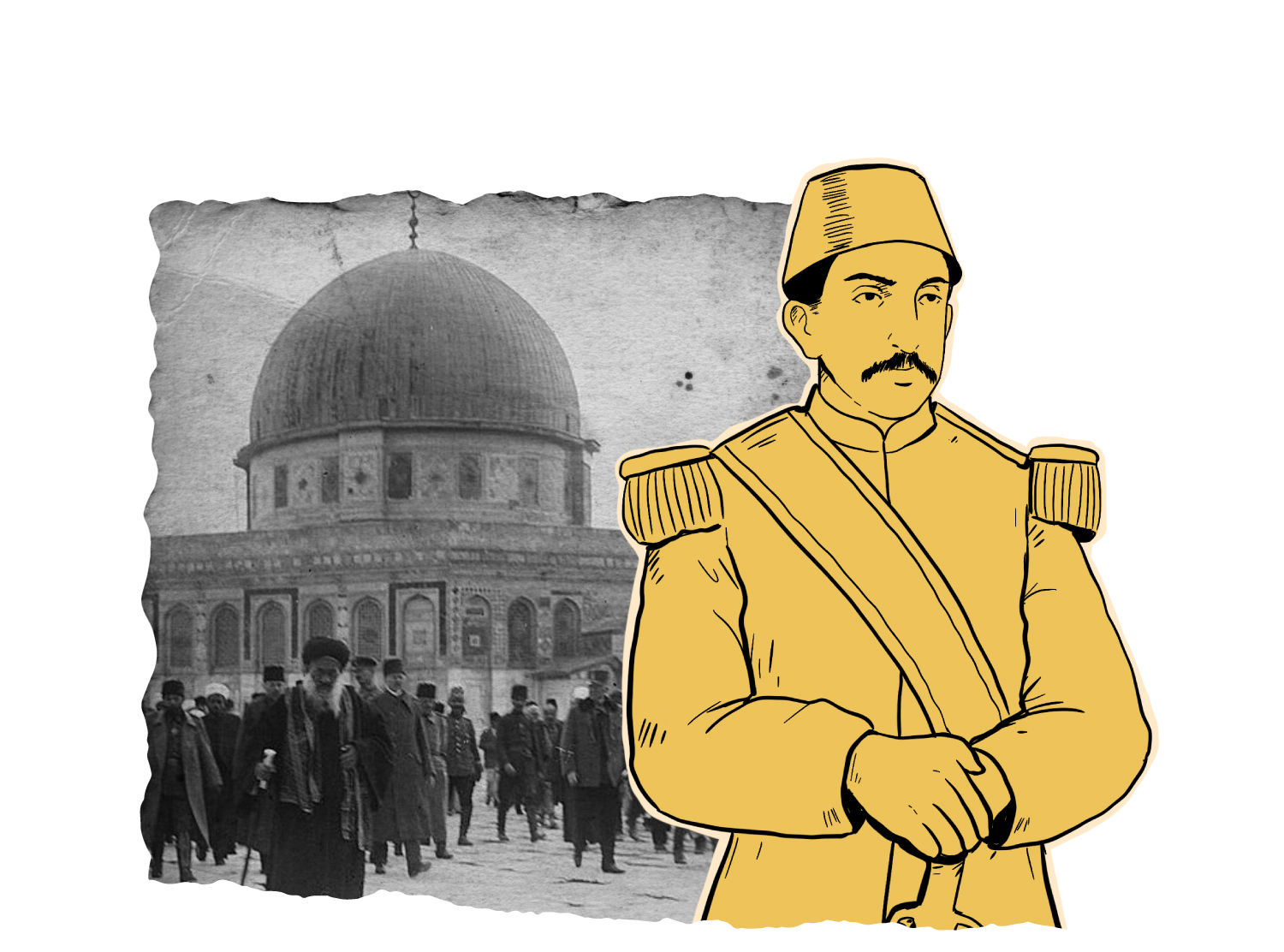
They helped them to immigrate and gave them foreign privileges
How did the Ottomans pave the way for the establishment of the Zionist state on the land of Palestine?
One of the controversial topics in the history of the Ottoman Empire is its attitude towards the Zionist movement and the Jewish settlement in Palestine. This topic entered the field of ideological struggle on the part of some historians specialized in the history of the Ottoman Empire, as well as large sections of the Islamic political movement’s writers. This issue was not considered scientifically based on the facts of history and the political pragmatism of the Ottoman state, especially in its weak years.
Among the most important examples of the sensitivity of this topic in Turkish writings is what the Turkish historian Ahmed Ak Kondez wrote in this regard and his defense of the Ottoman Empire’s attitude towards the Zionist settlement in Palestine: “Haters of the Turks in general and the Ottoman Empire in particular never tire of reversing the facts of history, including the actions of the Ottoman Empire in Palestine. Those who are ignorant of the legal and political system implemented in the lands of Palestine blame the Ottoman Empire for the calamities and accidents that befell the Arab world”.
On the contrary, the second group sees the direct responsibility of the Ottoman State for the increase of Jewish settlements in Palestine, as the Ottoman State established the Mutasarrifiya of Jerusalem, independent of the Levant Province. On the contrary, the second group sees the direct responsibility of the Ottoman State for the increase of Jewish settlements in Palestine, as the Ottoman State established the Mutasarrifiya of Jerusalem, independent of the Levant Province. This Mutasarrifiya included Jerusalem, Jaffa, Gaza, Hebron, and Beersheba. It became directly subordinate to the central government in Istanbul and was affiliated with the Ministry of the Interior.
The Ottoman decrees enabled the Jews to own land and establish camps in Jerusalem.

Many factors that the Ottoman Empire could not confront helped in the emergence of Jewish settlements in Palestine. The state was unable to confront them and sometimes overlooked them, especially in its weak years. Among the most important of these factors: The freedom that the Jews who were subjects of the Ottoman Empire enjoyed in moving and owning land by virtue of being Ottoman pastoralists.
As for the foreign Jews, an Ottoman firman was issued in (1869) allowing foreigners to own lands in the Ottoman Empire, and this contributed to the rapid formation of Jewish settlements. Some internal events in Russia and the persecution of Jews there also prompted a large wave of Russian Jewish emigration to Palestine and their ownership of lands there, especially since (1881).
Sultan Abdul Hamid II noticed the movement of the Jewish settlements and tried to exploit the desire of the Jewish Zionists to settle in Palestine. During the period between (1881-1888) the numbers and areas of the Jewish settlements increased, and in order to maneuver, Abdul Hamid II issued a firman in (1881) to limit the residence of Jews in Palestine for long periods, but the United States of America was not convinced by the firman nor the Ottoman clarifications sent by the Ottoman Empire to America that the motive behind the Ottoman firman was the fear of conflict between the Jews and the Arabs in Palestine.
The United States of America asked the Ottoman Empire to respect the foreign privileges and allow the foreign Jews to settle in Palestine and own lands. This made the Ottoman Empire retract its previous decision and declare that the previous firman would only be applied to the Jewish immigrants who came in large numbers and not to those who came individually.
The Jordanian historian Fadwa Nuseirat denounces the attitude of the Ottoman Empire saying: “Thus, in 1888, the Western countries were able to obtain a concession from the Sublime Porte allowing the Jews to settle in Palestine on the condition that they arrive individually and not in groups. This led to the failure of the state to prevent the Jews from settling in Palestine”.
Moreover, some foreign Jewish Zionists resorted to asking for the Ottoman patronage so that they would have all the rights in Palestine, including a memorandum submitted by the Ottoman Grand Vizier to the Ottoman Sultan in 1891: “To accept the granting of Ottoman dependency (nationality) to four hundred Jews in Safed and 40 in Haifa who came to the Palestinian lands”.
The Turkish Ahmed Ak Kondez mentions the Sultan’s rejection of the Grand Vizier’s request in the field of defending the attitude of the Ottoman Empire towards the Jewish settlement, but the document at the same time clarifies the disagreement between the institutions of the Ottoman rule in this regard and that there was no unified agreed policy towards the matter.
Thus, the weakness of the Ottoman Empire, the system of foreign privileges and the intervention of Western countries led to an increase in the number of the Jewish immigrants to Palestine and the expansion of the establishment of the Jewish settlements. Abdul Hamid II tried to manipulate the Zionist ambitions, negotiating the desire to obtain major gains, while at the same time pretending to the Islamic nation and the Arabs in particular that he tried to defend Palestine.


- Fadwa Nuseirat, The Role of Sultan Abdul Hamid II in Facilitating the Zionist Control of Palestine (Beirut: Centre for Arab Unity Studies, 2014).
- Irma Fadeeva, The Jews in the Ottoman Empire, translated by Anwar Ibrahim (Cairo: The National Center for Translation, 2021).
- Stanford J. Shaw, The Jews of the Ottoman Empire and the Turkish Republic (Cairo: Dar Al-Bashir, 2015).
- Afar Hassan, The Dönme sect between Judaism and Islam, 3rd Edition (Beirut: Al-Fajr Foundation, 1988).
- Ahmad Al-Nuaimi, The Jewish Minority and the Ottoman Empire (Baghdad: House of Cultural Affairs, 1990).
- Ibrahim Al-Allaf, The Role of Freemasonry in Contemporary Turkish Social and Political Life, Journal of Social Studies, House of Wisdom, Baghdad, Issue. (3,4), (1999-2000).
- Ahmed Ak Kondez and Saeed Oztok, The Unknown Ottoman Empire (Istanbul: Ottoman Researches Foundation, 2008).




